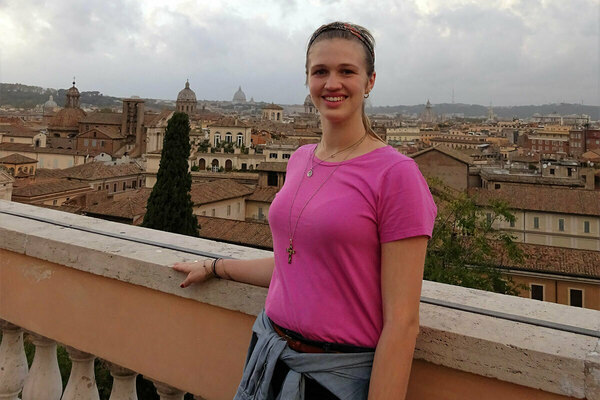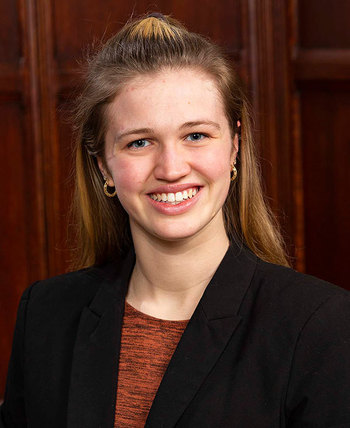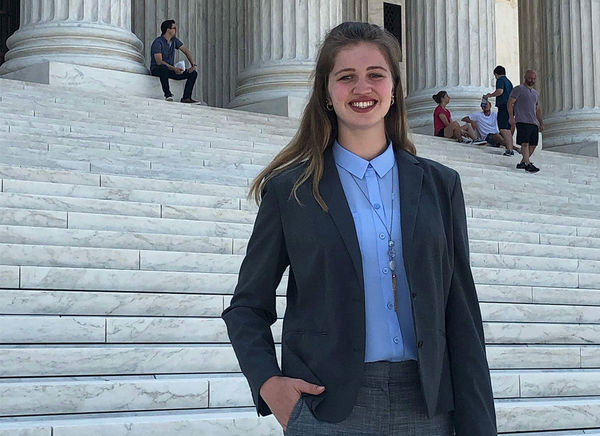

Morgan Peck didn’t know what she wanted to major in when she was applying to colleges. But an enthusiasm for learning and an openness to new experiences has helped her discover three disciplines she loves — sociology, Spanish, and constitutional studies.
And all three — plus her desire to serve others — intersect in an issue she hopes to devote her career to.
“In immigration law, I see a combination of my passion for learning about the Spanish and Latino cultures and my desire to help people,” she said. “That’s something that’s been instilled in me since I was very young — build a career by doing good.”
As international experiences, a summer internship, and her senior thesis helped her build her knowledge base and discern a vocational path, Peck found her academic programs to be an essential part of her process of preparing for the future.
“At the end of the day, learning about matters that are not only academic but ultimately social is what makes me excited to be learning,” Peck said. “I could have tried to do that through electives but going through the specific programs of study has drastically helped empower me to study what I want to study. I don’t think that would be possible outside of what Arts and Letters offers.”
“In immigration law, I see a combination of my passion for learning about the Spanish and Latino cultures and my desire to help people. That’s something that’s been instilled in me since I was very young — build a career by doing good.”
‘It just clicks’

Peck discovered her future major seemingly by happenstance, while scrolling through possible fields of study on her college applications.
An extrovert fascinated with how people operate in groups, she knew she had found the right discipline after taking an introductory sociology course — Understanding Societies, taught by associate professor Terrence McDonnell — during her first year.
“It just clicks in my head, in terms of understanding patterns and people and groups,” Peck said. “I love trying to figure out how people work. When you look at society and social problems, a lot of it has to do with how people relate to each other and how people’s own identities in that system interact with one another.”
While she was also drawn to political science based on her interest in a career in law, her initial coursework didn’t seem like the right fit. Then, her adviser — Mim Thomas, director of undergraduate studies in the Department of Sociology — suggested she explore the minor in constitutional studies.
“It’s been my way of engaging with explicitly legal questions in a way that is just a lot better for my brain,” she said. “It’s really helped me in processing whether I want to continue on this legal path and why am I so drawn to the law.”
‘An important skill to have’
Peck’s third area of study, a supplementary Spanish major, was a natural pursuit, given her interest in immigration law. She realized the immense value of speaking the language during an internship in Washington, D.C., working at the American Bar Association Commission on Immigration’s hotline for immigrants in detention centers.

“Spanish is an important skill to have in understanding the role of the Spanish speaking population in the U.S. immigration policy and immigration situation,” Peck said. “I saw that, in order to be a better person and a better lawyer, I wanted to learn Spanish and learn it well.”
Her passion for the language led her to Toledo, Spain, where she spent a semester studying and living with a host family. They provided her with an authentic view of Spain, from teaching her how to use public transportation on her commute to taking her on weekend trips to small Spanish towns.
“I walked away with a better understanding of what it means to engage in cultural competency — because it’s one thing to learn a language, but it’s another thing to try to understand the culture,” Peck said. “By learning Spanish, I was able to really engage with a whole new world and media and culture — whether it’s just being able to read all the instructions on the back of a box or being able to engage with literature that you wouldn’t be able to do just reading an English translation.”
‘Motivated to go forward’
Now, Peck is completing a senior thesis that combines sociology, Spanish, and constitutional studies by examining sanctuary law in Oregon and exploring the religious and political beliefs that surround immigration policy.
“What I love about the way my thesis is set up is being able to really dive into people’s stories from their eyes and trying to piece together their constellation of beliefs and views and what contributed to them and how they act from that,” said Peck, whose thesis adviser is associate professor Kraig Beyerlein. “It’s been something I’ve been working on for nine months, and it still gets me excited to work on it, even though it’s had its challenging moments.”
As a member of the Glynn Family Honors Program, Peck has formed relationships with other students who share her enthusiasm for engaging in conversations that dive deeper into academic interests. The connections she made in Glynn even led her to try new extracurricular activities, including the Not-So-Royal Shakespeare Company theatre group.
“I have been blessed to be connected to some very incredibly intelligent and academically creative people, which I’ve seen in the classroom and what they’re doing with their theses,” Peck said. “Without Glynn, I wouldn’t know nearly as many people, and I wouldn’t be able to have nearly as many deep grapplings with intellectual and academic matters.”
After graduation, Peck plans on attending law school — but first, she’ll spend a year in full-time service with Jesuit Volunteer Corps Northwest’s Northwest Justice Project, working as legal rights educator in Yakima, Wash., helping farmworkers and their families.
“Something I learned being in Spain was I need to give my brain a break, and I want to get some better perspective on what exactly I want to get out of law school,” Peck said. “Spending time in a service program will allow me to engage with issues that are important to me, and that makes me motivated to go forward.”
“At the end of the day, learning about matters that are not only academic but ultimately social is what makes me excited to be learning. I could have tried to do that through electives but going through the specific programs of study has drastically helped empower me to study what I want to study. I don’t think that would be possible outside of what Arts and Letters offers.”
Originally published by at al.nd.edu on April 27, 2020.